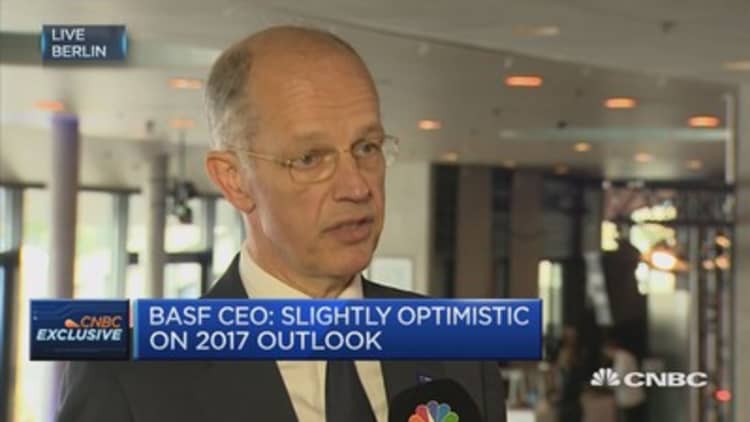U.K. Prime Minister Theresa May has accused the European Union of not wanting Brexit negotiations to be a success, as tensions between both sides escalate ahead of official talks.
"The events of the last few days have shown that - whatever our wishes, and however reasonable the positions of Europe's other leaders - there are some in Brussels who do not want these talks to succeed," May said Wednesday afternoon outside Downing Street.
Her comments follow media reports that the EU's Commission President Jean-Claude Juncker left London "10 times more skeptical" than he was before after a dinner with Prime Minister May last week. Their meeting has been described in the press as a disaster with both leaders clashing over key negotiating issues.
Earlier on Wednesday, Juncker described May as a "tough woman". May has said that she will be a "bloody difficult woman" during Brexit talks.
Speaking outside Downing Street, the head of the Conservative party went further and accused the European Union of wanting to interfere in the upcoming general election.
"Britain's negotiating position in Europe has been misrepresented in the continental press. The European Commission's negotiating stance has hardened.Threats against Britain have been issued by European politicians and officials. All of these acts have been deliberately timed to affect the result of the general election that will take place on 8 June," the prime minister said.
Theresa May called a snap election, hoping to increase her parliamentary majority and her negotiating power with Brussels.
The EU's negotiator, Michel Barnier, did not comment on the increasing tensions in U.K.-EU relations at a press conference on Wednesday morning. However, he said that the U.K.'s departure from the EU will not be "painless."
"Some have created the illusion that Brexit will have no material impact on our lives or that negotiations can be concluded quickly and painlessly. This is not the case. We need sound solutions, legal precision and this will take time," Barnier said.
Brexit Bill
The U.K. will have to pay a bill for leaving the European Union, but according to the EU's negotiator this "is not a punishment".
"I cannot accept that term: blank cheque. There was never any question of asking the UK to give us a blank cheque. That would not be serious. All we're asking for is that the accounts to be cleared for the honoring commitments the U.K. has entered," Barnier said.
"Leaving the union doesn't have a price, which has to be paid," he added.
The Financial Times reported earlier that the EU had revised its calculations for the so-called exit bill to 100 billion euros ($109.12 billion). The number floated in the press had until now been about 60 billion euros. According to the paper, the increase was due to the direct requests from France and Germany to cover post-Brexit farm payments and EU administration fees.
Barnier dismissed any figures while reiterating that the EU will use a "very precise methodology". "I don't wish to give any figures today. I can't because I don't know what the figures are," he said.
The methodology for the exit bill will be agreed with the U.K. during the upcoming negotiations, Barnier explained.
In London, the U.K.'s negotiator David Davies said Wednesday morning that his country would not pay a 100 billion euro bill. The government will pay what is legally due but "not just what the EU wants."
Barnier also vowed that it is the EU's main priority to ensure that European citizens living in the U.K. will be able to keep their current rights for their lifetimes.

Bank moves
Asia-focused bank Standard Chartered announced Wednesday that it is looking at opening a subsidiary in Frankfurt to secure access to Europe after the U.K. has left the European Union.
Chairman Jose
Earlier, JP Morgan Chase also announced that it will boost its current units in Dublin, Frankfurt, and Luxembourg to do business that it won't be able to do via London once the U.K. leaves the EU.


